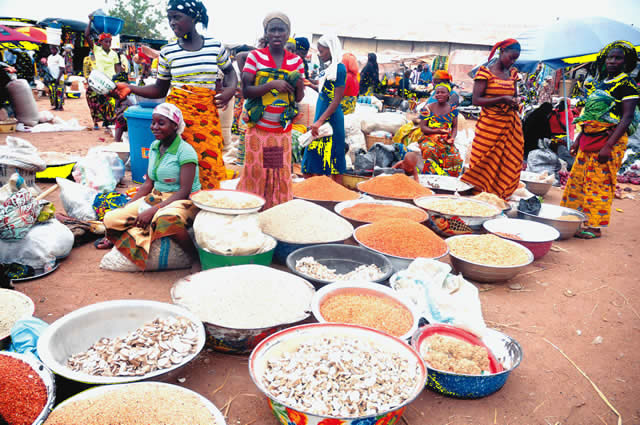
Lack of mechanised farming equipment, easy access to fertiliser, reliable produce marketing outlets and failure to effectively tackle farmers/herders clashes are among major reasons why food prices remain high even as harvest period peaks, experts have said.
Inflation records from the National Bureau of Statistic (NBS) indicate that despite eight consecutive months’ drop in inflation rate, prices of food items still remain on the high side.
A survey by Daily Trust in Utako Market in Abuja (FCT) indicated that prices of food items are still high.
A bag of rice now goes for N15,000-N16,000 while beans goes for N27,000; carton of frozen fish N12,000; a small basket of potatoes, tomatoes and onions about N1,000 each.
Traders in the market attribute the high cost of food items to the inability of the Federal Government to provide machineries for processing some food items to so as to boost local production and ensure value addition.
A rice seller in Utako market, Mohammed Isa, said local rice production in Kano is in top gear and that there is a variety of rice called “Umza rice” which quality is even slightly above the foreign variety.
He said the cost of the Umza rice is slightly above N15,000 because of the herculean task involved in processing it and the high quality the rice variety has.
A fish seller in Daki Biu Market in Jabi District of the FCT, Julie Musa, said the least cost of sardine fish variety she sells is N300 because of the cost of transportation from where she bought in cartons to resale at her stand where she sold in pieces.
“If I sell at N250, based cost price, there will be no gain at the end of the day for me as transportation alone has consumed the gain I am supposed to get,” she lamented.
An agriculturist, Josiah Kogi believed that the Anchor Borrowers Programme of the Federal Government, through the Central Bank of Nigeria (CBN) and the Bank of Industry, needs to be strengthened in terms of repayment of the loan by farmers.
“Some farmers find it very difficult to pay back the loan at the stipulated time due to delayed harvest and market forces, as such extension of time frame for repayment will be helpful to farmers and ensure efficient planning,” he stated.
He said localised farming, especially of rice needs to be encouraged in all the 36 states of the federation as apparently only Kebbi, Kano, Nasarawa, Ebonyi and Anambra have so far engaged in massive production of the staple crop.
A rice farmer in Kagoro, Kaura Local Government Area of Kaduna State, Luka Bityong, said the farming season this year experienced an improved supply of fertilisers compared to previous years. However, he attributed low participation in rice farming to herdsmen/farmers clashes which have ravaged the area as many farmers were afraid of attacks on their farmland.
He noted that because of the insecurity, very few farmers, including him, cultivated rice and as such the commodity is in short supply thereby making it difficult for the price to drop.
An Associate Professor of Finance at the Nasarawa State University, Keffi, Dr. Uche Uwaleke, revealed that in spite of the gradual decline in the core inflation, food index has remained the same on account of supply shortages and the high cost of transportation of farm produce.
“In order to bring down the cost of food items, there is an urgent need to address supply shortages, address security challenges as well as transport and power infrastructure,” he added.
Uwaleke maintained that if adequate and substantive decline in the prices of food items must be achieved in the country, farmers and other relevant producers of food must be equipped with the necessary facilities they need to boost local production as many food items like rice, frozen fish etc are still being imported into the country.
Source- Daily Trust
